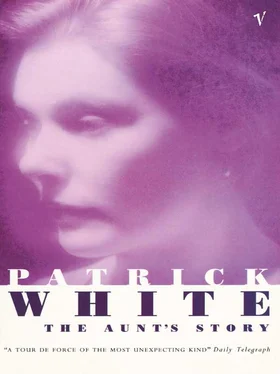‘You should relax, dear. You are tired,’ said Mrs Rapallo. ‘Or read a book. A book where things happen.’
Though you knew she did not believe that they do, outside the Almanach de Gotha .
Her dead, underwater eyes looked distantly at the nautilus, which Theodora now noticed in the room for the first time. Static and not, beside the compotier with the wax fruit, the nautilus flowered. You could almost touch it. But you did not touch. Because you cannot touch a music, a flowering of water, the white smile on the sleeper’s mouth. The nautilus flowered and flowed, as pervasive but evasive as experience. The walls of the Hôtel du Midi almost opened out.
‘It is strange, and why are we here?’ said the voice of Theodora Goodman, parting the water.
‘I guess we have to be somewhere,’ replied Mrs Rapallo.
IN the Hôtel du Midi the night slowly solidified. From the brown lounge Theodora listened to the doors closing, which was a quite definite closing, on other lives. As usually happens, and not less impressively each time, she was left to her own devices, like a mouse in a piano picking at the bones of a gavotte. Under the once-pink shade the light still burned, that somebody had forgotten, and the beads were still there to tell. On such occasions the soul will have faded a good deal. It jumps beneath its attempted composure. This was apparent to Theodora. She heard the exhausted springs of the arm-chairs. She saw the ash trays, which had brimmed almost over, with ash, and the exasperated gnawings of pale nails.
If Theodora continued to sit, it was for no great reason. She did not wait, or expect. She sat in a state of suspended will. She sat and heard in time the voice of Mademoiselle Berthe.
‘ Ma sœur a perdu sa brosse à dents ,’ she heard.
And the voice of Mademoiselle Berthe was disarranged.
‘She will hardly have left it on the piano,’ suggested Theodora.
‘ Je sais. Je sais. Je suis tellement nerveuse . First the amiable little stylo, and now the brosse à dents . I am walking for my own distraction,’ Mademoiselle Berthe explained.
She was disarranged. The hair of Mademoiselle Berthe had been prepared for the secret act of sleeping. Her hair was less wound. It hung in long white cotton ropes, down and down, the long white ropes of sleep. But she was not yet narcotisée . The black silk that she held wrapped to her bust palpitated still.
‘My sister is upstairs sipping a tisane ,’ said Mademoiselle Berthe.
To explain the absence of herself. For she was really only half there.
Theodora remembered, or had been told, that sometimes the conscience will rumble after camomile tea.
Mademoiselle Berthe continued to fret, groping over surfaces and rummaging in pockets. She looked out of the window.
‘There have been bombs,’ she said, ‘in Spain.’
As if she expected to see them flower, sudden and scarlet, in the still world of the jardin exotique . As if it were already the season of events. But the garden continued to wear the colourless expression of glass. There was a moon up. Its light ate at, but failed to consume, the ridge of flat metallic hills. These were a corroded acid-green. The garden was intact.
‘You see, there are no ruins,’ Theodora said.
She was comfortable with momentary wisdom. Soon she knew she would yawn.
‘No, but there are other indications. Do you realize, Miss Goodman, that walls are no longer walls? Walls are at most curtains. The least wind and they will blow and blow. Now I must go to my sister. We count the remainder of our possessions before we sleep.’
Theodora listened to the departure of Mademoiselle Berthe. She went on felt feet. The long cotton ropes unravelled into passages and silence.
‘Then I am also smug,’ said Theodora. ‘It is time I walked. For my own distraction.’
She walked through the hotel, choosing to lose herself, or not choosing, in the Hôtel du Midi there was no alternative. And especially at night. At night there was the space of darkness, a direction of corridors, stairs which neither raised nor lowered the traveller on to a different plane. In this rather circular state, Theodora walked with her hands outstretched, to ward off flesh or furniture if the occasion should arise.
‘ Vous désirez quelque chose, Mademoiselle? ’
She saw in time that this was Monsieur Durand. He still spoke professionally, but his voice, his face, were drained. Monsieur Durand, Theodora saw, could not have produced even a glass of water, if she had asked for it. Because Monsieur Durand himself was asking. He was drained by asking for what he would not be given.
‘No,’ said Theodora. ‘Thank you. I think I have, more or less, everything I want.’
‘Ah,’ breathed Monsieur Durand, as if not quite convinced.
‘And you, Monsieur Durand? What is the matter?’ Theodora asked.
‘ Rien ,’ said Monsieur Durand.
Though quite obviously he meant tout .
Braces gave him an exposed look. Theodora knew that he must have varicose veins, and perhaps a collection of colonial stamps. More certain than his circulation, flowed, under the stubble, some great subterranean despair, of which he would have told now, if his voice had not grown stiff describing confort moderne to arriving guests. So Monsieur Durand remained a face on braces in the dark.
‘ Eh bien. Mademoiselle, je vous souhaite une bonne nuit ,’ he said.
‘Thank you,’ Theodora replied.
Her gratitude was formal, but it was what Monsieur Durand, in spite of his braces, would expect.
Then he was a detached cough, as Theodora continued to circulate. Sometimes a blade of light, between a carpet and a door, slit the darkness. She saw the boots in duplicate, of the Demoiselles Bloch of course, their long dark tongues perplexed and lolling on the mat. But these fragments of identity and the regular appearance of a china knob, designed apparently for turning, did not convince her of the importance either of feet or hands. The act of darkness demolished personality.
Guided by a corner of darkness, a kink in endlessness, just after she had touched with surprise and hope the bones of her own face, Theodora passed an open doorway that blinded by its audacity, or rather an unconscious insolence of solid light. The audacious doorway had the same contemptuousness as certain flesh, which does not interpret dreams, nor see beyond its own reflection.
Looking through the lit doorway, Theodora saw that le petit stood in the mirror. He stroked his vanity through the glass, and his vanity was golden, more convincing than darkness, the sullen, golden face of flesh. Le petit loved his reflection endlessly, his back turned on any irrelevance, whether it was the cough of Monsieur Durand, Theodora was not sure, or the sigh of Henriette. Because le petit did not acknowledge desires, except his own. He was his own solid, golden flesh. He blew the smoke from his straight nose and watched for his glass face to clear.
Theodora trod quietly so as not to disturb any exposed dream. She would have asked which way, if it had been decent to inquire, but it was not. When the darkness settled down again, she began to feel that she was lost. She touched the darkness for a sign. She touched a face that was soft and tough as chamois leather.
‘ Ah, c’est vous ,’ sighed the voice of Henriette. ‘ Personne ne dort plus .’
‘I think I am lost,’ said Theodora. ‘ Je cherche ma chambre .’
In the darkness the disapproval of Henriette was implied. It was dry and unexpressed. Her feet chafed. Theodora followed the direction that was taking shape. She was again a child. It was soft as sighs yielding to the superior wisdom of Henriette.
Читать дальше












